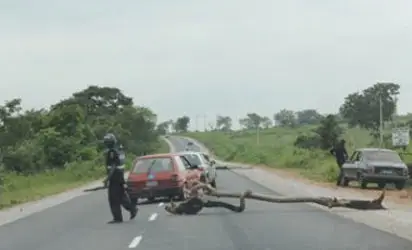National Issues
Illegal Roadblocks: A Menace to Nigerian Roads -By JoyJane Ekeocha
Despite these glaring issues, the Nigerian government and relevant agencies have remained largely unresponsive. If the roads were properly maintained and transportation was efficiently managed, security agencies would not need to resort to excessive roadblocks. Instead, they would rely on advanced surveillance, intelligence gathering, and well-coordinated patrols to ensure safety without disrupting travel.

Traveling in Nigeria was once a delightful experience, filled with excitement and adventure. Whether for business, tourism, or visiting loved ones, journeys across the country used to be smooth and enjoyable. However, that reality has changed drastically. What should be a simple trip has become a dangerous and frustrating ordeal, with road users facing an endless series of obstacles, both natural and man-made.
The deplorable state of Nigerian roads is undeniable. Regardless of the region, North, South, East, or West—travelers are confronted with deep gullies, enormous potholes, and hazardous craters that make movement a challenge. Yet, as terrible as these roads are, another menace is compounding the problem: illegal roadblocks.
It is nearly impossible to drive for five kilometers on any major highway without encountering security checkpoints. The presence of police officers, soldiers, customs officials, road safety personnel, and immigration officers has become a common sight, turning the highways into an endless series of stops and delays. While their role is supposedly to maintain security and ensure the safety of travelers, the reality on the ground tells a different story. These roadblocks, rather than offering protection, have become sources of frustration, unnecessary delays, and, in some cases, deadly accidents.
On a recent journey from Lagos to Benin, over fifty roadblocks were encountered along the route, while another trip from Patani to Port Harcourt revealed more than thirty-five. The frequency of these stops is alarming, causing heavy traffic congestion, increased fuel consumption, and a significant waste of time. What should have been an eight-hour journey stretched to thirteen hours, and many travelers now find themselves spending up to twenty-four hours on the road for trips that previously took less than half that time.
Beyond the inconvenience and economic impact, these roadblocks are creating dangerous situations that put lives at risk. On a fateful day along the Ijebu-Ode-Ore road, a poorly positioned checkpoint led to a tragic accident. A forty-foot container truck, struggling to navigate around a security barricade placed on a sharp bend, lost control and swerved into the opposite lane. In a matter of seconds, it crashed head-on into a fourteen-seater Hummer bus, crushing it beyond recognition. The driver died instantly, and several passengers sustained severe injuries. The wreckage painted a grim picture of how easily such roadblocks can turn deadly.
The consequences of these disruptions go far beyond individual tragedies. The constant delays on the roads mean increased fuel consumption and higher transportation costs, which in turn drive up the prices of goods and services. Businesses relying on road transport suffer heavy losses due to the unpredictable travel time, and the overall efficiency of the transport sector is severely compromised. At a time when Nigeria is struggling with economic challenges, these unnecessary roadblocks are worsening the situation instead of improving security.
Despite these glaring issues, the Nigerian government and relevant agencies have remained largely unresponsive. If the roads were properly maintained and transportation was efficiently managed, security agencies would not need to resort to excessive roadblocks. Instead, they would rely on advanced surveillance, intelligence gathering, and well-coordinated patrols to ensure safety without disrupting travel.
The Federal Road Maintenance Agency (FERMA) must take urgent steps to repair and maintain the roads, while the Ministry of Transportation should work towards modernizing the transport system. Security agencies must focus on their primary responsibility of protecting citizens rather than creating unnecessary hindrances. The National Union of Road Transport Workers (NURTW) must also rise to the occasion and advocate for the rights of road users, ensuring that their voices are heard.
The state of Nigerian roads reflects the broader inefficiencies in governance and infrastructure management. Without immediate action, the country will continue to suffer economic setbacks, increased accident rates, and unnecessary hardship for travelers. Nigeria cannot afford to let its roads remain death traps. The time for change is now, and it is up to the authorities to take decisive action to restore safety, efficiency, and dignity to road travel.










